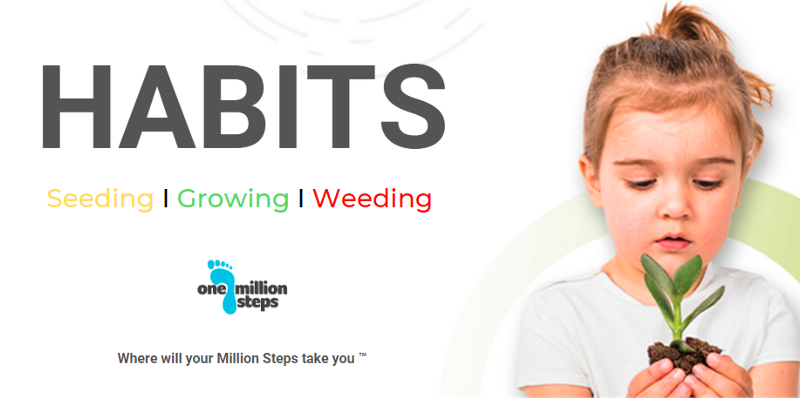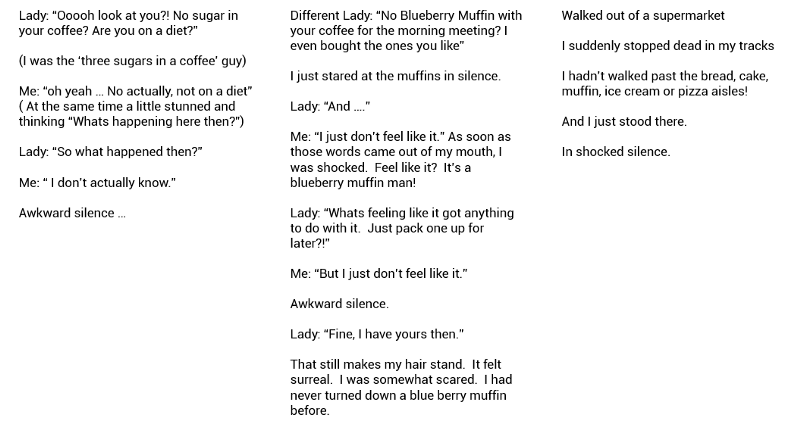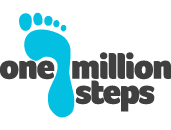
AKA “Will someone please tell me what is happening to me!”
This is an awareness and fine-tuning exercise.
Habits. Where do we begin? This is a very VERY big topic.
But when I envisioned the Million Steps Challenge, I was determined that we would cover Habits.
For just one reason: Once you understand why you have a habit (good or bad), or understand how a pattern can form a new habit(good or bad), it’s hard not to
> see the dots that connect > the sequence of events > that lead to an action (the habit)
Wendy Wood, at the American Psychological Association’s 122nd Annual Convention, gave a presentation titled “Habits in Everyday Life: How to Form Good Habits and Change Bad Ones”
She pointed out that a whopping 40 per cent of people’s daily activities are performed each day in almost the same situations.
Habits emerge through associative learning. “We find patterns of behaviour that allow us to reach goals. We repeat what works, and when actions are repeated in a stable context, we form associations between cues and response,” Wendy Wood
40%! But let’s not kid around, many of these patterns of behaviour keep us alive. Stopping at a traffic light for example.
But there are others that are not so life-saving. Like “How did I get from writing an email to standing in front of the fridge with a spoon and a tub of ice cream in my hand?” (Yea that’s me. But I learned how. Though the ice cream still wins somedays.)
So a huge part of looking at any aspect of habits is AWARENESS AND REFLECTION. Only we can go through the stages of
> “writing an email” to
> (blank, no memory)
> “standing in front of the fridge with a spoon and a tub of ice cream in my hand?”
And when we begin to look at the blank/no memory, we will find that there were reasons. The key is identifying them.
Another thing that changed my view of habits was I realised something; that as a society we are really forgiving. AND We easily forgive ourselves, because its what we have become used to it (aka excuses).
We also sympathise when a friend says they have a really bad habit.
Often we respond with “Wow … yea, it’s a difficult habit to change/break”
No one ever says to us, “Hey let’s break this down and see what are the component parts that make up the development of this habit”. (Which would be nice if just a little scary)
Furthermore, if all habits were actually just routines, then …
I decided to replace the word “habit” to “routine” to test this out.
When I said “Yea, I have a really bad routine”, often the response was puzzlement, followed by disinterest … “Errr, so just change it then?”
Over time, I spoke to others it almost seemed that if we said we had a bad habit, it was as if we had given up on the “blank/no memory” stage of the habit. Almost as if it was pre-ordained.
But as soon we referred to it as a routine, we seem to see the stages that led to the spoon ice-cream moment.
Over the next two days, we will look at an overview of building a habit and breaking a habit.
But first, I want to touch on something so fundamental, that it’s important to understand that not all habits are equal and some are much more powerful than others: Keystone Habits.
My discovery began when “strange” transformations took place on the first three Million Step Challenges I took. Here are just three instances that I will never forget:

I figured it had something to do with me doing lots of walks. I realised that for me, these instances seem to suddenly be noticed (usually by others) between day 45 and 55 part of the challenge.
But how did it “just happen”? How did I not see the changes as they developed? I asked doctors, I asked friends.
I just wanted to know if there was a “name” for what I had experienced.
It was during my 4th Million Steps Challenge that I read The Power of Habit: Why We Do What We Do in Life and Business is a book by Charles Duhigg, a Pulitzer winning author. Dhuigg describes Keystone Habits as:
“small changes or habits that people introduce into their routines that unintentionally carry over into other aspects of their lives”
So a keystone Habit is a habit that matters more than others. Keystone Habits seem to set off a chain-reaction of other habits.
An example of this is daily exercise. A lot of people, when they start to exercise habitually, without even thinking about it, start eating better.
They also stop using their credit cards as much, they procrastinate 20 minutes less per day, and they do their dishes sooner.
The theory behind Keystone Habits is that when you experience success in an area that has a deep emotional value to you, then your self-esteem grows and you believe you can do more, so you so. In other words, you see yourself as a “winner” and you start behaving that way. Source:
Suddenly it all clicked. I realised that because I was walking and getting my steps every day, the effect was this:
- No matter what happened in the day, however bad it was, if I did the steps; NO ONE COULD TAKE THAT AWAY FROM ME. I HAD WON! It was my own little victory. And I began to subconsciously give myself a mental pat on the back (Thanking yourself and acknowledging the effort of doing something good even if it was a tough day is important)
- Because I was doing the steps, I slept better (or at least I told my self I had to go to bed at a particular time so I could get my steps in the morning which was what I did. This meant I had subconsciously built up a routine)
- Because I slept better I had more energy and focus. My craving for coffee started to drop. Or at least I thought I was craving coffee (I actually hate the taste of coffee) Then I realised something incredibly powerful. I wasn’t even going for my hourly caffeine fix. I was going for my hourly three teaspoon sugar hit!
- As this need for an hourly sugar fix slowly became less frequent and finally vanished, my diet had slowly changed. I was having less stodgy carb-based food like pasta or rice or potatoes. In fact I wanted to eat “lighter” and I remember clearly starting to buy cucumbers and tomatoes and throw them on a plate with any meal I had.
- and as this cycle began to entrench itself, I would get up in the morning, do my bed, get to the bathroom, brush my teeth, put on my walking shoes (which I now put close to the bed with my other walking gear the night before) and was out the door.
- And I would return proud of myself for really rocking it! And sit down to begin work.
The thing is. I never actually saw it. It all happened so gradually and naturally that I suddenly reached …
Lady: “Ooooh look at you?! No sugar in your coffee? Are you on a diet?”
(I was the ‘three sugars in a coffee’ guy)
Me: “oh yeah … No actually, not on a diet” ( At the same time a little stunned and thinking “Whats happening here then?”)
Lady: “So what happened then?”
Me: “ I don’t actually know.”
Awkward silence …
I realised my keystone habit was exercise.
“When people start habitually exercising, even as infrequently as once a week, they start changing other, unrelated patterns in their lives, often unknowingly. Typically people who exercise start eating better and becoming more productive at work. They smoke less and show more patience with colleagues and family. They use their credit cards less frequently and say they feel less stressed. It’s not completely clear why…‘Exercise spills over,’ said James Prochaska, a University of Rhode Island researcher. ‘There’s something about it that makes other good habits easier.’” (p. 109) Charles Duhigg
There are others. but the TRINITY seems to be Exercise, Sleep, Diet.
In my case, the cascade effect of improvement was actually in that order
> More Exercise > Better Sleep > Improved Diet
Or
> Better Sleep > More Exercise > Improved Diet
I have never been very successful at
> Improved diet > …… because the effect of bad sleep (fatigue) and little exercise (no morale boost) seemed to impact on the choices I made for food (i.e. I was always going for food that “lit” up my brain, like sugar, to get my fix)
BUT: We are all so very different and there are others that can change our lives in different areas. Business Insider gives a brief list of eight keystone habits that are worth considering.
But choose one Keystone Habit. And start there.
Just remember:
“Excellence is an art won by training and habituation … we are what we repeatedly do. Excellence, then, is not an act but a habit” Will Durant, The Story of Philosophy (1926), p. 76
To find out more about the Million Steps Challenge and how we can help you, your business or charity, please visit https://millionsteps.com
Or Register your organisation interest: Million Steps CoVid-19 Package here
